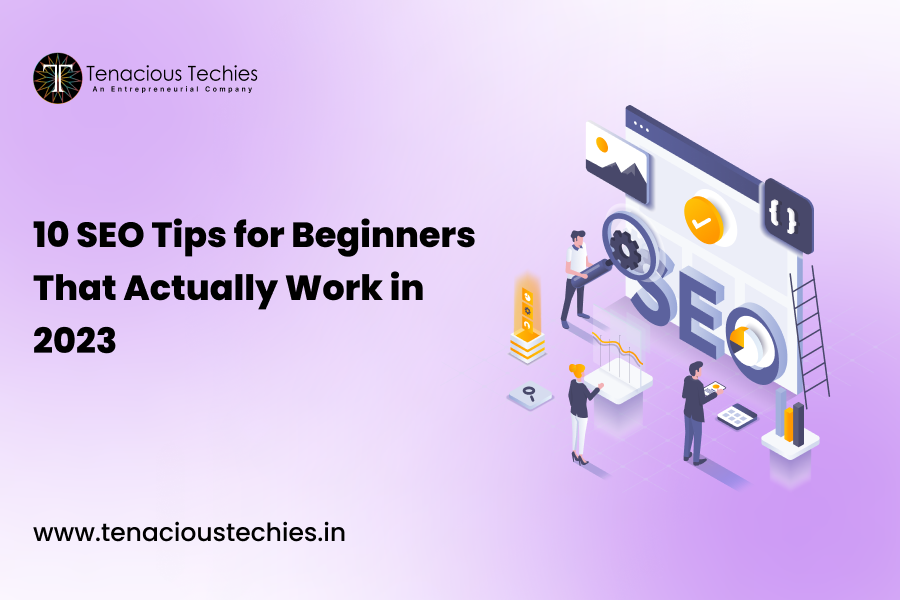
Want to boost your website traffic and get more visitors in 2023?
Search engine optimization (SEO) is the key to ranking higher in search results and getting more people to see your website.
But with so much conflicting information out there, it can be tough to know where to start.
That’s why we’ve put together this list of 10 SEO tips for beginners that actually work in 2023.
1. Conduct keyword research
The first step to any SEO campaign is to conduct keyword research. This involves identifying the keywords and phrases that your target audience is using to search for information online.
Once you have a list of relevant keywords, you can start to incorporate them into your website’s content and structure.
There are a number of different keyword research tools available, such as Ahrefs, SEMrush, and Google Keyword Planner. These tools can help you identify relevant keywords, search volume, and competition.
2. Optimize your website’s title tags and meta descriptions
Your website’s title tags and meta descriptions are the first thing that people see when they search for your website in SERPs.
It is important to optimize these elements to include your target keywords and make your website look more appealing to potential visitors.
Your title tag should be unique to each page on your website and should accurately reflect the content of the page. Your meta description should also be unique to each page and should be no more than 155 characters long.
3. Create high-quality content
One of the most important factors in SEO is the quality of your website’s content. Your content should be well-written, informative, and relevant to your target audience and make sure that the content is user generated.
It is also important to publish new content on a regular basis to keep your website fresh and active.
When creating content, be sure to include your target keywords throughout the text, but avoid keyword stuffing. Keyword stuffing is the practice of overloading your content with keywords in an attempt to improve your ranking in SERPs.
However, this practice can actually have the opposite effect and can lead to your website being penalized by search engines.
4. Build backlinks
Backlinks are links from other websites to your own. Backlinks are an important factor in SEO because they signal to search engines that your website is authoritative and trustworthy.
There are a number of ways to build backlinks, such as creating high-quality content that other websites will want to link to, guest blogging on other websites, and submitting your website to relevant directories.
5. Optimize your website for mobile devices
More and more people are using their smartphones and tablets to access the internet. It is important to make sure that your website is optimized for mobile devices so that it provides a good user experience for mobile visitors.
There are a number of ways to optimize your website for mobile devices, such as using a responsive design, making sure your text is large and easy to read, and avoiding using too many pop-ups and ads.
6. Use social media
Social media can be a great way to promote your website and content. When you share your content on social media, be sure to include links back to your website.
You can also use social media platforms to engage with your audience and answer their questions.
7. Use Google Search Console
Google Search Console is a free tool that provides you with insights into how your website is performing in SERPs.
You can use Google Search Console to track your website’s traffic, identify any errors, and submit your websitemap to Google.
8. Use Google Analytics
Google Analytics is another free tool that provides you with insights into your website’s traffic and visitors. You can use Google Analytics to track your website’s traffic sources, most popular pages, and conversion rates.
9. Monitor your results
SEO is an ongoing process, so it is important to monitor your results and make adjustments as needed. You can use Google Search Console and Google Analytics to track your website’s traffic and ranking in SERPs.
10. Be patient
SEO takes time to produce results. Don’t expect to see your website ranking at the top of SERPs overnight. It can take several months or even years to see significant results.
However, if you consistently implement the SEO tips listed above, you will eventually see improvement. Just be patient and keep working at it.
Conclusion
These are just a few tips to help you get started with SEO. If you want to learn more, there are a number of resources available online and in libraries.
Remember, SEO is an ongoing process. It is important to monitor your results and make adjustments as needed. With consistent effort, you can improve your website’s SEO and visibility.
Bonus tip:
Here is a bonus tip to help you improve your website’s SEO:
- Use structured data. Structured data is a way of marking up your website’s content so that search engines can better understand it. This can help your website appear in rich snippets, such as featured snippets and knowledge graphs.
There are a number of different structured data formats available, such as Schema.org and JSON-LD. You can use a tool like Google’s Structured Data Markup Helper to generate the necessary markup for your website.
If you want to start your career in SEO, check out the Tenacioustechies SEO course. The course is comprehensive and taught by experienced SEO professionals.
You will also have access to a variety of resources to help you succeed and 100% job placement guarantee.
